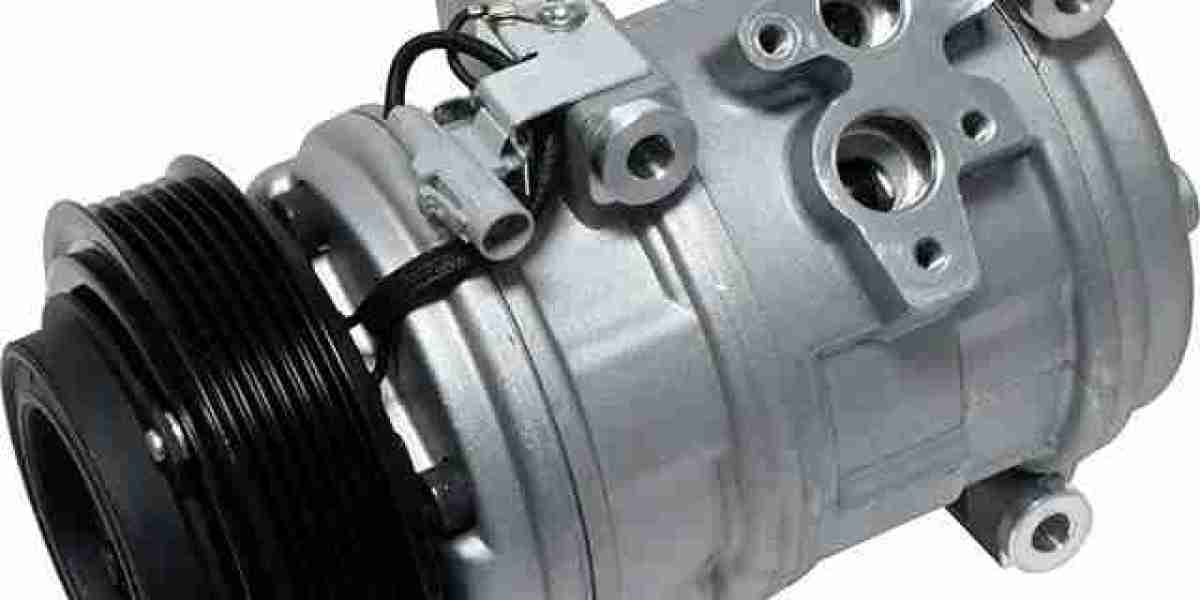The automotive compressor market has entered a dynamic phase of growth and innovation, driven by the rapid transformation of the global automotive sector. As vehicle manufacturers push toward electrification, improved fuel efficiency, and enhanced passenger comfort, compressors—an essential component of vehicle HVAC systems—are undergoing substantial technological evolution. These systems are not only responsible for air conditioning but also, in electric vehicles (EVs), play a critical role in thermal management of battery packs.
This article highlights the major developments in the automotive compressor market, exploring new technologies, sustainability trends, and strategic expansions across global markets that are reshaping this essential component's future.
Evolution of Compressor Technology
One of the most significant areas of development in the automotive compressor market is the shift from traditional mechanical compressors to electric compressors. Traditional belt-driven compressors relied on the vehicle's internal combustion engine (ICE) to function. In contrast, electric compressors are powered independently, enabling their use in electric and hybrid vehicles. These units offer better energy control, improved efficiency, and flexibility in vehicle design.
Key advancements include:
Scroll and Rotary Compressors: These are gaining popularity due to their quieter operation, compact size, and enhanced performance over piston-based designs.
Variable Displacement Compressors (VDCs): These allow for flexible cooling depending on cabin needs, reducing fuel consumption and emissions in ICE vehicles.
Integrated Thermal Management Systems: Compressors are now being integrated into broader thermal systems that manage both passenger comfort and critical components such as batteries and inverters.
Emphasis on Sustainability and Green Technology
Global environmental regulations are heavily influencing the automotive compressor market. Compressors are now being developed to operate with low-global warming potential (GWP) refrigerants, such as R-1234yf, replacing older, ozone-depleting refrigerants like R-134a. This shift is crucial for manufacturers to meet global emissions standards and contribute to greener automotive technologies.
In addition to refrigerant innovation, manufacturers are focusing on:
Energy-efficient compressor designs to reduce power draw from engines or battery systems.
Lightweight materials to lower the overall weight of compressor units, aiding in vehicle fuel economy and range.
Eco-conscious production methods that minimize waste and carbon footprints in manufacturing processes.
Impact of Electrification on Compressor Development
The global push toward electric vehicles is significantly influencing the direction of compressor development. Since EVs do not have a traditional engine to drive a mechanical compressor, electric compressors have become a necessity. Their ability to operate independently of engine function allows for precise temperature control—essential for battery longevity and passenger comfort.
Recent EV-related developments include:
Compact and modular electric compressor units suitable for multiple EV platforms.
High-voltage compressor systems compatible with the evolving architecture of next-generation electric vehicles.
Dual-function systems where compressors manage both cabin air conditioning and battery cooling simultaneously, optimizing space and efficiency.
Regional Developments and Market Expansion
The automotive compressor market is experiencing rapid developments not just in technology but also in regional expansion strategies. Manufacturers are increasingly localizing production to meet specific market needs, reduce costs, and navigate regional regulations.
Asia-Pacific remains the global leader in production and consumption, with China, Japan, India, and South Korea driving growth. The region’s booming automotive industry and rising EV production are creating opportunities for local and international compressor manufacturers.
Europe is investing in high-efficiency and sustainable compressors, driven by strict environmental standards and growing EV sales. Countries like Germany, France, and the UK are at the forefront of incorporating low-emission HVAC systems into vehicles.
North America is witnessing steady compressor innovation aligned with the growing popularity of EVs and hybrids. Automakers are forming partnerships with tech providers to integrate next-gen compressors into future vehicle lines.
Latin America, the Middle East, and Africa are emerging as new markets, with rising vehicle ownership and increasing demand for climate-controlled transport, although cost sensitivity and infrastructure challenges still play a role.
Strategic Partnerships and Industry Moves
Several global players are making bold moves to secure their positions in the evolving automotive compressor space:
Denso Corporation has invested heavily in electric compressor technology tailored for EV platforms and compact vehicles.
Valeo and Hanon Systems are collaborating with automakers to provide next-gen thermal systems.
Sanden Holdings and Mahle GmbH are expanding their R&D centers to develop intelligent, eco-friendly HVAC solutions.
BorgWarner and Mitsubishi Heavy Industries are entering new markets through acquisitions and regional manufacturing setups.
These collaborations aim to streamline innovation, cut costs, and quickly adapt to changing consumer and regulatory demands.
Challenges Ahead
Despite its promising outlook, the automotive compressor market also faces challenges:
Cost and complexity of electric compressors may slow adoption in cost-sensitive regions.
Regulatory changes can disrupt production planning and development timelines.
Supply chain vulnerabilities, such as raw material shortages, continue to affect manufacturing schedules.
However, these hurdles also present opportunities for agile manufacturers who can innovate quickly and build resilient operations.
Conclusion
The automotive compressor market is undergoing transformative developments that promise long-term growth and technological evolution. With a clear emphasis on sustainability, electrification, and efficiency, compressors are becoming smarter, greener, and more adaptable. Manufacturers embracing these trends—while expanding into new regions and forming strategic partnerships—are poised to thrive in this fast-moving industry. As the global automotive landscape continues to shift, the role of advanced compressors will become even more critical in shaping the vehicles of tomorrow.




